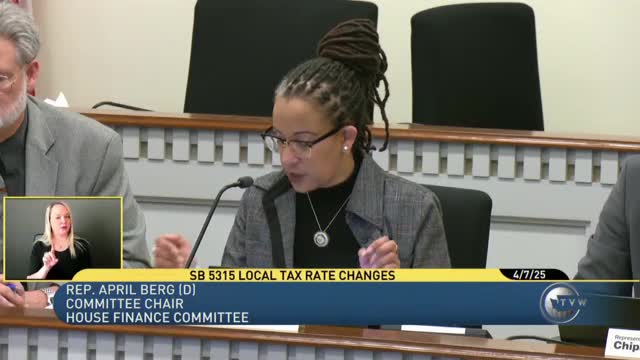Committee hears bill to ban flavored tobacco, raise cigarette and vapor taxes
Get AI-powered insights, summaries, and transcripts
Subscribe
Summary
At a House Finance Committee public hearing, staff and witnesses presented House Bill 2068, which would ban flavored tobacco and entertainment vapor products, raise licensing fees and penalties, and restructure cigarette, tobacco and vapor taxes to fund youth prevention and public health accounts.
At a House Finance Committee public hearing, staff and supporters outlined House Bill 2068, a package of licensing, product‑ban and tax changes aimed at reducing youth use of flavored tobacco and electronic vapor products and generating revenue for prevention and public health accounts.
The bill would ban the sale, display and advertising of any flavored tobacco or nicotine product and of entertainment vapor products beginning July 1, 2027, except for flavored shisha sold on premises where people under 21 are prohibited, staff said. It also creates new business licensing fees and raises penalties for violations, and it restructures taxes on cigarettes, tobacco products and vapor products and creates new revenue allocations for prevention, cancer research and foundational public health services.
House Office of Program Research staff member Peter Clodfelter summarized the regulatory provisions, saying the bill would prohibit “any tobacco or nicotine product that imparts a taste or smell other than the taste or smell of tobacco, including the taste or smell of fruit, candy, mint, or menthol, or if it imparts a cooling or numbing sensation.” He also described the bill’s definition of covered “entertainment vapor products” as devices that include interactive gaming or multimedia features.
The licensing changes increase many existing fees: license fees would be raised to $1,000 per year for cigarette, tobacco and vapor product retailers, wholesalers and distributors (up from a current range of $150–$650), cigarette vending machine fees would rise from $30 to $200 per year, and cigarette‑making machine fees would rise from $93 to $500 per year. The bill adds record‑keeping and inspection provisions and allows seized or forfeited products to be destroyed, staff said.
On penalties, staff said the proposal would raise monetary fines and add suspensions: a first violation for selling to persons under 21 or selling a prohibited flavored or entertainment product would carry a $2,000 fine for retailers (up from the current $1,000 for some retailers), with a 30‑day license suspension and higher fines for repeat violations in a three‑year window and a $20,000 monetary penalty for a fifth or subsequent violation.
Tax changes described by committee staff Rochelle Harris would add a $2 per pack tax on cigarettes, effective for the purposes shown in the bill, with adjustments beginning December 2028 and every three years thereafter by inflation plus 1 percent. The bill would change tobacco products and alternative nicotine product taxation to a rate equal to 95 percent of the taxable sales price (with little cigars taxed like cigarettes). Vapor products would be taxed at a flat 95 percent of the taxable sales price and the definition of taxable vapor products would be expanded to include entertainment vapor products and flavored products. Preexisting inventories would be subject to the new vapor tax with reporting to the Department of Revenue by 01/31/2026 and payment by 04/30/2026 of the difference in tax due.
Staff also specified revenue allocations: the first $5,000,000 of new cigarette tax receipts would be deposited into a youth tobacco and vapor products prevention account, with the remainder to the general fund. For vapor product receipts, the first $25,000,000 would be split 50/50 between the Andy Hill Cancer Research Endowment Fund and the Foundation Public Health Services account, with remaining revenues to the general fund. Several staff noted a fiscal note had been requested and would be distributed when available.
Sponsor Rep. Christine Reeves framed the bill as both a prevention and enforcement package rooted in personal experience. Reeves said, “my mom started smoking cigarettes when she was just 9, and menthol at that, and then spent an entire life addicted to tobacco and nicotine products” and described a goal of reducing youth initiation and supporting cessation and enforcement.
Supporters at the hearing included the Association of Washington School Principals, public health groups, the Campaign for Tobacco‑Free Kids, the American Cancer Society Cancer Action Network and a large number of students and parents who testified that flavored products and small, concealable devices have become common in school bathrooms and classrooms. The Association of Washington School Principals described vaping as “one of the biggest learning distractions” and urged ending the sale of flavored products to reduce classroom disruption.
Opponents included convenience store associations, retail trade groups, independent grocers, vape shop owners and some small‑business representatives who warned the changes would shrink legal sales and push some purchases to unregulated or out‑of‑state markets. Jackson’s Food Stores’ category manager said the proposals would be “unfair regressive taxes” and raised estimates of cross‑border and illicit market activity. Retail groups urged consideration of potential downstream impacts on small businesses that use social media and digital services for sales and outreach.
Several testifiers — including vape retailers and industry groups — urged more enforcement funding for the Liquor and Cannabis Board rather than a broad flavor ban, and recommended revenue shares or dedicated funding for enforcement. Public health and pediatric groups countered that flavors are a major driver of youth uptake and cited evidence linking nicotine exposure in adolescence to addiction and harms to the developing brain.
No committee vote on the bill was recorded during the hearing; testimony was taken and the hearing was closed.
Ending: The committee closed the public hearing on HB 2068 without taking a final vote; the bill remains under consideration and proponents and opponents submitted written testimony for committee review.
